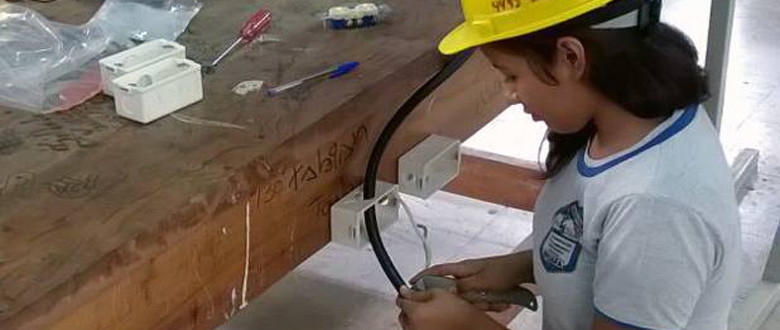
Schneider Electric, the Schneider Electric Foundation and VVOB have signed an agreement to support the Ecuadorian Ministry of Education (MINEDUC) in improving teaching and learning in secondary technical schools that offer 'electrical installations, equipment and machines'. The collaboration showcases a good example of alignment between the supply of technical education and labour market needs. Students will enjoy better employment opportunities whilst companies receive more skilled workers, in a context of considerable government investment in electrification, including in marginal areas of rural and urban communities.
Public–private partnership to benefit students
Partnerships between governments, education actors and employers are important to ensure that education and training become responsive to labour market and industry needs and to secure opportunities for teachers and students to upgrade their competencies. Over the past two years, VVOB has been instrumental in brokering several public – private partnerships through the creation of regional networks of secondary technical schools that offer the same trade and engage in collaborative agreements with businesses that absorb graduates from that trade. With VVOB’s support, district-level officials from MINEDUC in the provinces of Santo Domingo and Manabí are gradually taking on the coordination of these networks.
Thanks to the agreement with Schneider Electric and the Schneider Electric Foundation a new network of eight secondary technical schools teaching “electrical installations, equipment and machines” has been established. Students in these schools will benefit from quality teaching and learning opportunities focused on competencies needed in the world of work. At the same time, the public – private partnership supports Ecuador’s electrification programmes, which are expected to have poverty reducing effects, increase productivity and enhance educational opportunities.
From pilot to scale
On the basis of their suitable infrastructure and favourable location, three schools in the network have been selected to act as antennas, to be equipped by Schneider Electric. Teachers and third-year students from the other schools will travel to these locations to enjoy quality training. The target is to reach minimum 300 students and 25 teachers over the course of two school years.
For both teachers and students, Schneider Electric has designed a 120-hour training course adapted to their specific learning needs. The training for teachers includes 50 hours of online coursework and 70 practice hours leading to official recognition from MINEDUC in case of successful completion. This recognition is an important incentive as Ecuadorian teachers are expected to engage in continuous professional development in order to climb the ladder of the carrera educativa. The training for students is likewise recognised as part of the official curriculum. In addition, MINEDUC dedicates two pedagogical counsellors to the project whose role is to coach the participating teachers in lesson planning, allowing them to bring their new content knowledge and improved technical skills to the classroom. This, together with the collegial learning that is stimulated through the regional network of secondary technical schools, should bolster the sustainability of the project’s results.
The goal of this first stage of the collaboration is to refine this basic model and establish its viability at a small scale through testing in specific contexts. As part of this first step towards scaling up, metrics to judge the success of the regional networks will be established. Considerable attention will also go to preparing the decentralised services of the Ministry of Education to fully take on its coordinating role.




